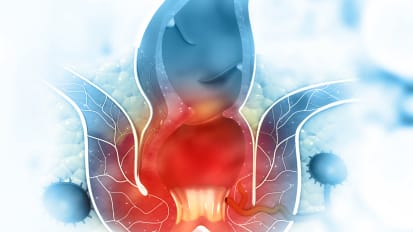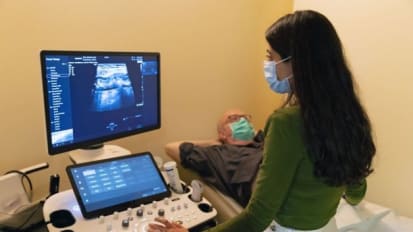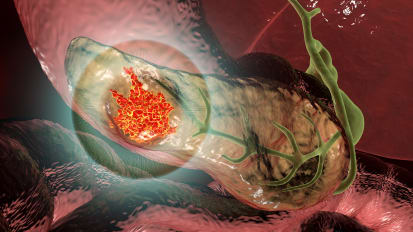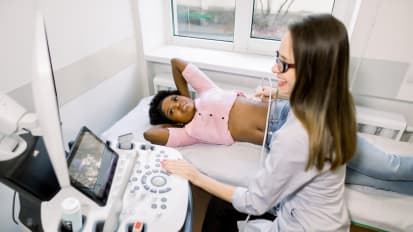Search
 News
News
First Global Guidelines for Pregnancy and Inflammatory Bowel Disease Developed
For women with inflammatory bowel disease (IBD), pregnancy can be an uncertain time due to limited clinical data about how IBD medications impact pregnancy outcomes and infants who have been exposed to IBD medications in utero. News
News
How We Could Test for Unhealthy Alcohol Use Before It's Too Late
A new study finds that a blood test may be a more reliable indicator of liver disease than asking how much a person drinks. Video
Video
IBS Diarrhea in Primary Care: Shorter Routes to Diagnosis and Symptom Assuagement
Diarrhea related to irritable bowel syndrome is common, yet because it's a functional – not anatomical – disorder, providers frequently run more tests than necessary while patients worry and wait in discomfort. Document
Document
Physician Referral Guide: Liver Tumor Clinic
THE UCSF LIVER TUMOR CLINIC provides specialized multidisciplinary care for patients with early- and intermediate-stage liver cancer and benign liver tumors. News
News
Using AI to Improve Detection of Rare Diseases
Acute hepatic porphyria (AHP) is a rare genetic disease with symptoms that overlap with many other conditions, making it extremely challenging to diagnose. Its symptoms mostly affect women with severe, sometimes life-threatening attacks that include abdominal pain, nausea, vomiting, limb weakness and anxiety. News
News
Panel Issues First Guidelines to Prevent Anal Cancer in People With HIV
Results from a national study led by UC San Francisco informed the first guidelines at the federal level in the United States to detect and treat anal cancer precursor lesions in people with HIV to reduce the risk of developing anal cancer. News
News
Can a New Drug Candidate Cure Pancreatic Cancer?
UC San Francisco researchers have designed a candidate drug that could help make pancreatic cancer, which is almost always fatal, a treatable, perhaps even curable, condition. News
News
Can AI Predict Serious Adverse Events From IBD Therapies?
In a groundbreaking study, UCSF researchers used a new clinical large language model (LLM) to identify serious adverse events (SAEs) occurring in patients treated with immunosuppressants to manage inflammatory bowel disease (IBD). Video
Video
Navigate the New World of Genetic Testing: Tips and Tools for PCPs
In this practical yet nuanced talk, gastroenterologist Aparajita Singh, MD, MPH, describes technological advances and dwindling barriers that are making tests for pathogenic gene variants more valuable and available than ever before. Video
Video
Pain in the Butt: Tips on Diagnosing and Caring for Hemorrhoids and Fissures
Diana Ziser Rego, an adult-gerontology nurse practitioner with expertise in lower GI disorders, describes efficient routes to identifying hemorrhoids and anal fissures, offering tips on what questions to ask, straightforward management plans and guidance on when to refer. News
News
Physician Survey Shows Lack of Understanding of the FDA’s Approval Process
Many physicians are unfamiliar with how the Food and Drug Administration’s (FDA) regulates new drugs and medical devices, and they may be under the impression that the data supporting these approvals are more rigorous than they are, according to a national survey of physicians conducted by researchers at UC San Francisco (UCSF). News
News
Robotically Assisted, Completely Minimally Invasive Whipple Surgery: Case Study With Video
Since performing San Francisco’s first pure robotically assisted Whipple procedure in 2022, UCSF surgeons continue to be on the forefront of this technology, regularly performing robotic Whipple surgeries (pancreatoduodenectomies) on select patients. News
News
New Research on Optimizing UC Management Through Patient-Centered Tofacitinib Dosing
Tofacitinib is effective for managing ulcerative colitis (UC) and is linked to sustained steroid-free remission. The product label recommends dose de-escalation after eight or 16 weeks, but is this best for patients? News
News
There’s a More Humane Way to Monitor Crohn's and Colitis Patients
IBD, which comprises Crohn’s disease and ulcerative colitis, affects 1.3% of the U.S. population and accounts for 3 million new diagnoses every year. News
News
First-line Pembrolizumab Plus Chemotherapy May Benefit Patients with Advanced Biliary Tract Cancers
The addition of pembrolizumab (Keytruda) to gemcitabine and cisplatin improved overall survival in patients with untreated metastatic or unresectable biliary tract cancer, according to results from the phase III KEYNOTE-966 clinical trial. Document
Document
Alcohol-Associated Liver Disease Program
UCSF HEPATOLOGY AND LIVER TRANSPLANT SERVICES have established the Alcohol-Associated Liver Disease Program, expanding access to hepatology care and liver transplantation for a broader range of patients. Video
Video
Primary Care of the IBD Patient: Risk Factors, Symptoms and the Value of Timely Therapeutics
In this update on inflammatory bowel disease, gastroenterologist Kendall Beck, MD, notes contributing causes, explains which tests have value, gives keys to distinguishing ulcerative colitis and Crohn’s... News
News
Research Reveals Mechanisms at Work in Progression of Pancreatic Cysts to Pancreatic Cancer
Tumor Immune Microenvironments May Provide Clues to Future Therapies News
News
UCSF Develops First of Its Kind Robotic Surgery Trial in Partnership with FDA
UCSF Health is recruiting patients for the only FDA-approved study of the use of single port robotic technology for colorectal surgery in the United States. News
News
Strategies for Reducing Length of Hospital Stay for Patients With Acute Severe Ulcerative Colitis
In a first-of-its-kind study, UCSF researchers assessed factors prolonging length of stay (LOS) for a diverse population of hospitalized patients with acute severe ulcerative colitis (ASUC) and identified interventions to reduce LOS for these patients. Video
Video
The Evidence on Incidentalomas: When to Investigate, When to Rest Easy
This presentation from radiologist Hailey H. Choi, MD, supplies straightforward criteria to help providers assess lesions ranging from thyroid and adrenal nodules to ovarian cysts to pancreatic and liver lesions. News
News
Genetic Gut Microbiome Variations Point to Precision Treatments for Metabolic Conditions
In a new study, UCSF researchers found that the gut microbiome of East Asians is distinct from that of White individuals living in the same geographic region. This discovery may lead to personalized treatments for various metabolic conditions, including diabetes and obesity. Video
Video
A Guide to GERD: Managing Symptoms and Complications of a Common Condition
With gastroesophageal reflux disease affecting 40% of the U.S. population every month, primary care providers need a straightforward plan for initiating therapy, as well as an up-to-date understanding of causes and treatment complications. News
News
Endoscopic Removal of Benign Complex Colorectal Lesions Improves Patient Outcomes
Endoscopic mucosal resection (EMR) is a safe and effective alternative to surgery for benign complex colorectal lesions, according to research led by UCSF gastroenterologist Tonya Kaltenbach, MD.

